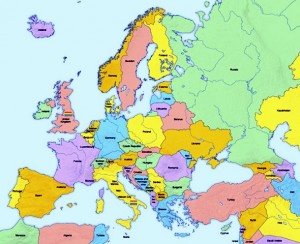The issue of family values has been a theme of American conservatism and the Republican Party since at least the 1970s. Generally speaking, those values as articulated by the right have come in the form of attacks on LGBTQ rights, the Equal Rights Amendment, sex education in schools, abortion rights, certain government programs, supposed “socialist” initiatives such as social welfare programs, and immigrant rights.  Conservatives have long warned against “an overbearing state that insinuated itself into the traditional [white heterosexual] nuclear family, particularly through the public education system, in order to usurp parental authority and place children in opposition to their parents’ values.” Most of these critiques still find their way into conservative talking points, political ads, stump speeches, and op-eds, especially during election season. And many of these criticisms have a racialized (and sometimes antisemitic and anti-Muslim) flavor: whatever is perceived as a threat to a white, mostly male, heterosexual, (non-liberal) Christian social framework is the “enemy.”
Conservatives have long warned against “an overbearing state that insinuated itself into the traditional [white heterosexual] nuclear family, particularly through the public education system, in order to usurp parental authority and place children in opposition to their parents’ values.” Most of these critiques still find their way into conservative talking points, political ads, stump speeches, and op-eds, especially during election season. And many of these criticisms have a racialized (and sometimes antisemitic and anti-Muslim) flavor: whatever is perceived as a threat to a white, mostly male, heterosexual, (non-liberal) Christian social framework is the “enemy.”
In a less politically charged context, family values can have much more positive connotations, according to Fatherly.com: kindness, self-compassion/self-care, integrity, responsibility, mutual respect, honesty, flexibility and fairness. Other qualities can be added. In some Democratic-leaning contexts, family values can also include promotion of a living wage, universal health care, same-sex adoption, and gay marriage.
What kind of “family values” do we want as a nation? When we head to the polls in this and every other election, which candidates at all levels best reflect and uphold those values? In our personal lives, what kinds of activities do we undertake that promote those values? How do we promote family values through our individual, family, state and even national spending practices?
Let us look briefly at how we in the US view and promote family values, as compared to some of our sister nations (approximately 14 of which rank higher than the US on a number of quality-of-life measures).  To immediately ward off a consistent right-wing criticism that peer nations such as those of the EU, for instance, are “socialist” and therefore not worthy of our consideration, let us point out again that, in order to be a member of the European Union, which currently numbers 27 members and over 447 million people, a country must have “a stable democracy and the rule of law, a functioning market economy and the acceptance of all EU legislation, including of the euro.” This is why, in part, these nations are considered our peers: they are like us in their basic contours. Do not let anyone distract from this discussion by using the term “socialist:” EU nations and two in Europe that are not EU members – Norway and Switzerland – are not socialist!
To immediately ward off a consistent right-wing criticism that peer nations such as those of the EU, for instance, are “socialist” and therefore not worthy of our consideration, let us point out again that, in order to be a member of the European Union, which currently numbers 27 members and over 447 million people, a country must have “a stable democracy and the rule of law, a functioning market economy and the acceptance of all EU legislation, including of the euro.” This is why, in part, these nations are considered our peers: they are like us in their basic contours. Do not let anyone distract from this discussion by using the term “socialist:” EU nations and two in Europe that are not EU members – Norway and Switzerland – are not socialist!
Parenting and child-rearing
When we talk about family values, we can legitimately start with parenting and child-rearing, and we can probably assert that most Americans who become parents want to do the best job they can according to their circumstances. Unfortunately, there are many constraints to doing that, whether it is because of finances, lack of affordable child care, the absence of a federal law granting paid parental leave, poorly-funded schools, and so on.
The poverty rate in the richest country in the world is considerably higher than over 35 or 40 other nations, depending upon the report used. This is an issue for families! We have supposedly been trying to reduce poverty for decades, but it has obviously fallen short.
Some of our peer nations tackle poverty in at least two ways. The “Nordic theory of love,” for one, maintains that making individuals stronger and self-sufficient makes for well-functioning families and a stronger society overall. Therefore, national parental leave policies in these countries are generous and roughly equal between men and women. “By ensuring independence for each parent. . . the family as a whole grows stronger” (Partanen, 93).
Second, when it comes to support for parents who may or may not be officially married, married and cohabiting parents in the Nordic countries receive approximately the same benefits for their children. If a child has only one parent, “society steps in to support that parent with his or her emotional, financial, and logistical hardships” – for the benefit of the wider society (Partanen, 88). In Germany, when a parent stops working or reduces working hours to look after a new-born child, families are paid between 300 and 1,800 euros per month, and this payment is made for up to 14 months.
These practices are starkly different from how we in the US approach parenting and child-rearing. American parents must pay out-of-pocket not only for health care (which is covered at the federal level by most or our sister nations) but also for child care – not to mention housing, transportation and other expenses borne by all of us. What is the real “family value” when it comes to parenting and child-rearing? Is it not to have the resources they need not just to survive but to thrive, and to raise the best children they can?
Education
When children enter the picture of a family – and even for adults later in life – education becomes a major factor. We Americans value education at all levels – at least in theory. But our system falls far short of that of many of the nations to which we compare ourselves.
For one thing, it has long been known that there is a longstanding gap in test scores between black and white American students. A recent study by the Brookings Institution has discounted some earlier theories and policies and proposed a different approach: “The most promising school-related strategies for reducing the black-white test score gap seem to involve changes like reducing class size, setting minimum standards of academic competency for teachers, and raising teachers’ expectations for low-performing students. All these changes would benefit both blacks and whites, but all appear to be especially beneficial for blacks.”
 This means that we need more teachers in order to reduce class size, teachers need to be paid well to be attracted to the profession, and they need to be well-trained in order to keep up with the latest methods and policies. Is it any surprise that all of these have long been priorities in advanced nations with better test scores and educational outcomes for their students? In Finland, for instance, respect for teachers is now ingrained in the country’s constitution (Partanen, 118), and this is carried out at a number of levels. Partanen reports that Finland requires all teachers to have master’s degrees: “Today teacher-training programs are among the most selective university majors in the country” (133). While Finnish teachers do not make much more money than that of other professions that require a master’s degree, “in the United States teachers tend to earn clearly less than even the typical college graduate” (Partanen, 135). Further, “The countries that perform best in the global PISA survey are those that tend to invest the most in their teachers” (Partanen, 135; PISA is the Programme for International Student Assessment of the Organisation for Economic Co-operation and Development).
This means that we need more teachers in order to reduce class size, teachers need to be paid well to be attracted to the profession, and they need to be well-trained in order to keep up with the latest methods and policies. Is it any surprise that all of these have long been priorities in advanced nations with better test scores and educational outcomes for their students? In Finland, for instance, respect for teachers is now ingrained in the country’s constitution (Partanen, 118), and this is carried out at a number of levels. Partanen reports that Finland requires all teachers to have master’s degrees: “Today teacher-training programs are among the most selective university majors in the country” (133). While Finnish teachers do not make much more money than that of other professions that require a master’s degree, “in the United States teachers tend to earn clearly less than even the typical college graduate” (Partanen, 135). Further, “The countries that perform best in the global PISA survey are those that tend to invest the most in their teachers” (Partanen, 135; PISA is the Programme for International Student Assessment of the Organisation for Economic Co-operation and Development).
We can make similar observations about higher education; most of our peer nations have a more “family friendly” philosophy than we do – very low-cost university education. As George Lakey points out in Viking Economics:
- The seven Norwegian public universities are tuition-free. Nordics “will not load tuition debt on the backs of their young people who want further education” (144).
- “Free public post-secondary schooling is available for technical fields, . . for arts fields . .. . and for professions like medicine and law” (144).
What are family values when it comes to education, including higher education or training after the high school level? How about affordability, fairness, accessibility, and having our children primed for success, no matter their race, their zip code, or their parents’ status?
Labor and work
What about labor, workers and related issues? Over time, conservatives in power have generally won the day by decimating union participation in the US, and Republican voters generally have an unfavorable view of unions. In contrast, unions have become more popular among left-leaning voters in the US lately, perhaps because unions bring many advantages to individuals, the workplace and society in general: shorter workweeks, greater job security, improved working conditions, better salaries, “productivity, profitability, efficiency and overall stability.”
Many of our sister nations have known about the advantages of unionization for decades. Strong, centralized unions exist in Germany, Austria, Belgium, Sweden, Finland, and the other Nordic countries; “every type of industry has a specific union, which are then gathered in large national union confederations.” While conservatives in the US tend to argue that unions mean higher costs, lack of flexibility, the risk of strikes, and often adversarial relations, these downsides are outweighed by the many advantages. In the Nordic countries especially, high unionization rates go hand in glove with high productivity; as economist James Galbraith explains, strong rules “guard against lazy or incompetent managers who try to maintain profit by underpaying employees rather than doing their job of increasing efficiency. Strong unions fight for the Nordic model, which incentivizes productivity” (Lakey, 88).
Is the balance between work and the rest of one’s life a “family value”? The pandemic appears to have put this into stark relief among US workers, but policies in many of our sister nations have promoted work-life balance for many years. European Union regulations state that an employer “must ensure that the average weekly working time for your staff – including overtime – does not exceed 48 hours. Your employees must rest for at least 11 consecutive hours daily.” There are similar regulations in place in Norway and Switzerland, which are not EU members.
If work-life balance is a legitimate “family value” for Americans, following the example of other advanced nations in the areas of work, labor, and unions is the way to go.
Climate and the environment
Americans of all stripes rank the climate crisis and the health of our environment among their top priorities when polled. This is especially true of young people, who want governments around the world to do more to combat the ravages of climate change.
 Therefore, another “family value” is the health of our planet. Again, it is Democratic officials for the most part who support legislation to protect the environment. Republicans tend to vote against bills that would help the environment in one way or another, even when they say that climate change is a major problem. Their arguments – if they offer any at all – usually have to do with cost. Yes, we all need to be responsible spenders of taxpayer money, but a short-sighted focus on expense that ignores the long-term cost of many decades of neglecting climate problems does not enhance “family values” and is hypocritical at best and extremely dangerous at worst.
Therefore, another “family value” is the health of our planet. Again, it is Democratic officials for the most part who support legislation to protect the environment. Republicans tend to vote against bills that would help the environment in one way or another, even when they say that climate change is a major problem. Their arguments – if they offer any at all – usually have to do with cost. Yes, we all need to be responsible spenders of taxpayer money, but a short-sighted focus on expense that ignores the long-term cost of many decades of neglecting climate problems does not enhance “family values” and is hypocritical at best and extremely dangerous at worst.
Violence
As we’ve noted in the past, the violence rate in the US – especially violence related to guns – is among the highest in the world among advanced nations.
- The gun-related murder rate in the US is 25 times higher than 22 other high-income nations.
- “Americans are seven times more likely to die from violence and six times more likely to be accidentally killed with a gun.” Other advanced nations, with far less gun violence, tend to have much stricter national legislation on guns.
Conservatives in the US want to argue that everything except the extremely high number of guns in our nation are what causes our excessive rate of gun violence and gun deaths (including accidents and suicide). The majority of Americans, however, want better regulation on behalf of gun safety, required background checks for all gun buyers, “red flag” laws allowing police and family members to petition judges to confiscate guns from individuals at elevated risk of violent behavior, a ban on assault rifles, and a waiting period for firearm purchases.
These Americans are “families” of one kind or another! One of the main values of these families is safety! When Republicans in office steadfastly refuse to back legislation that supports the family value of safety, why do they keep getting elected? It is primarily Democrats who support gun safety legislation and this family value; it is Republicans who should be voted out of office and candidates who support gun safety laws who need to replace them.
Summary
“Family values” that we have considered include:
- Best parenting and child-rearing practices
- High-quality education at all levels for all citizens
- Work-life balance
- Protecting the environment
- Safety
Many more could be listed.
Our midterm election looms. After that, no matter what happens, our nation will continue in some form. Family values will still be priorities. What kind of values will those be, and how can each of us embody, create and preserve them?
For Further Reading
Hill, Steven. Europe’s Promise: Why the European Way is the Best Hope in an Insecure Age. Berkeley and Los Angeles, CA: University of California Press, 2010.
Lakey, George. Viking Economics: How the Scandinavians Got It Right – and How We Can, Too. Brooklyn and London: Melville House, 2016.
Partanen, Anu. The Nordic Theory of Everything: In Search of a Better Life. New York: HarperCollins Publishers, 2016.
Reich, Robert B. Saving Capitalism: For the Many, Not the Few. New York: Vintage Books, 2015.
